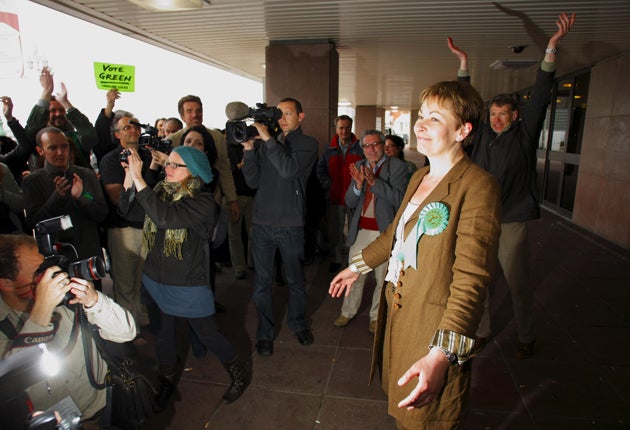One Brighton shining moment as Lucas makes Green history
After years of struggle, the environmental movement has taken a giant step forward

Your support helps us to tell the story
From reproductive rights to climate change to Big Tech, The Independent is on the ground when the story is developing. Whether it's investigating the financials of Elon Musk's pro-Trump PAC or producing our latest documentary, 'The A Word', which shines a light on the American women fighting for reproductive rights, we know how important it is to parse out the facts from the messaging.
At such a critical moment in US history, we need reporters on the ground. Your donation allows us to keep sending journalists to speak to both sides of the story.
The Independent is trusted by Americans across the entire political spectrum. And unlike many other quality news outlets, we choose not to lock Americans out of our reporting and analysis with paywalls. We believe quality journalism should be available to everyone, paid for by those who can afford it.
Your support makes all the difference.After a wait of 25 years the Green Party finally arrived in Westminster yesterday after the voters of Brighton Pavilion elected Caroline Lucas as the country's first Green MP.
The former Oxfam adviser was elected on by far the most radical manifesto of all the parties, and immediately promised that she would "constantly shine a light on the gap between the other parties' rhetoric, and what they actually deliver".
The fact that Ms Lucas is the first Green MP anywhere in the world to be elected under the first-past-the-post system underlines the remarkable scale of her achievement as the leader of a party which a decade ago was widely regarded as a political joke, and which she herself has been instrumental in modernising. Amid 6am scenes of delight and jubilation from her supporters, the 49-year-old current MEP for South-east England – a position she will resign – took the seat by overturning a Labour majority of nearly 6,000, with an impressive 31 per cent of the vote.
Her election ended the anomaly by which Britain was the only major European country which had never had Green members of its national legislature. The new politics founded in the 1970s by Die Grünen in Germany, which for the first time put the environment at the top of the agenda alongside the economy, health and education, has finally taken root in Westminster, and Ms Lucas said she was confident that more Green MPs would follow her.
"All the evidence we have of getting Greens on to local councils, into the Scottish Parliament, into the European Parliament and the London Assembly shows that once we get that foot in the door, we're here to stay," she said.
There is no doubt that her success represents a crucial breakthrough for her party, in terms of political credibility, although hers was the only victory in what was the Greens' biggest general election campaign ever, with 335 candidates standing around the country at a cost of nearly £400,000, a hefty sum for such a small party.
The Greens had concentrated on the three target seats of Brighton Pavilion, Norwich South and Lewisham Deptford, in all of which they had strong support with significant representation on the local councils. But in truth they had bet the farm on Pavilion, the constituency at the heart of what is Britain's most "alternative" city where the Greens have always had a strong presence – in the last election in 2005 they secured 22 per cent of the vote, their best parliamentary result up to that time.
Three factors led to their success, the sympathetic nature of the constituency being the first. The second was the personality of Ms Lucas herself. Passionate and articulate, radical while seeming unthreatening, Ms Lucas is the most formidable political operator produced by the Green Party since Jonathon Porritt a quarter of a century ago, and a world away from the image of the Green party activist as a sandal-wearing lentil eater.
The third factor behind her success was the Greens' work to get their vote out in the constituency on Thursday, a professional operation which involved 200 volunteers, with vote-checkers at all the 50-plus polling stations. "We have come a huge way in the last 20 years, and what we have done in particular is to professionalise our approach," she said.
"But what I would highlight is that we haven't changed the policies. What's happened is that some of the issues we've been forecasting for very many years, including [the] reality of climate change, for example, have actually come to pass, and therefore our policies are being seen as ever more urgent and ever more relevant."
Yet it was by no means clear on election night that her success was a foregone conclusion. Arriving at the count at the Brighton Centre on the seafront at midnight, she looked tired and drained and said she felt "sick and nervous with the weight of so many people's expectations on me".
The first sign of success came at 5.45am when the returning officer summoned the candidates and their agents, and Ms Lucas's husband, Richard Savage, emerged with a smile the size of a soup plate. A few minutes later his partner was telling her cheering supporters: "For once, 'historic' fits the bill." She had polled 16,238 votes, compared with the 14,986 of her nearest rival, the Labour candidate, Nancy Platts, and said she felt "exhausted but incredibly happy".
By contrast, the Tory candidate, former banker Charlotte Vere, who had slipped from second in the polls in January to trail in third place with 12,275 votes, looked like she had swallowed a wasp.
Join our commenting forum
Join thought-provoking conversations, follow other Independent readers and see their replies
Comments